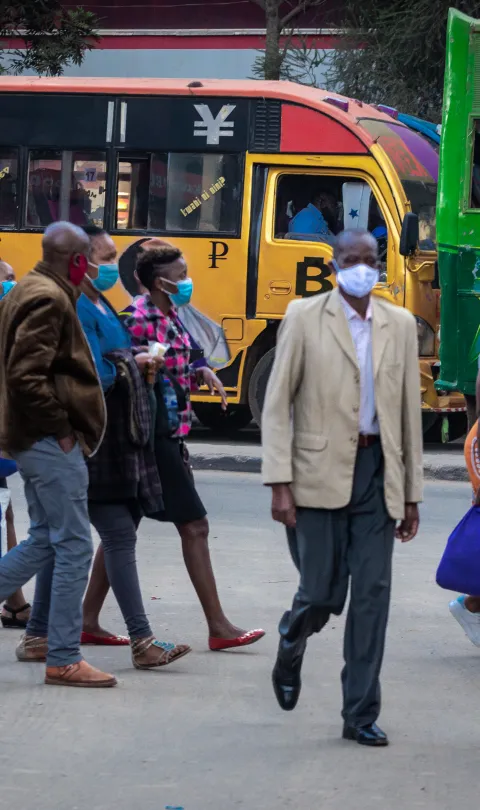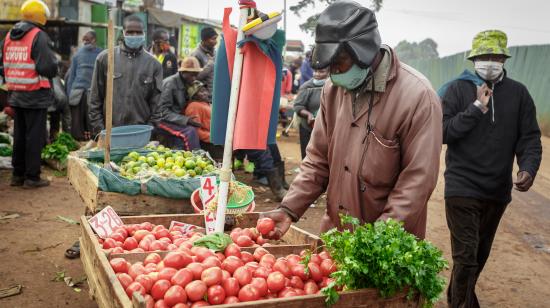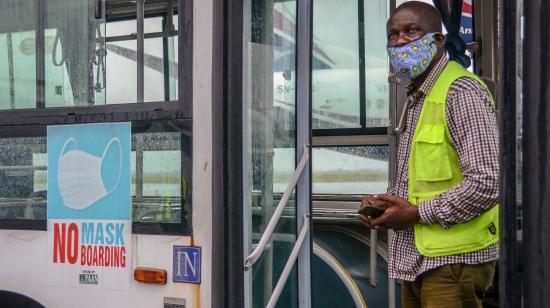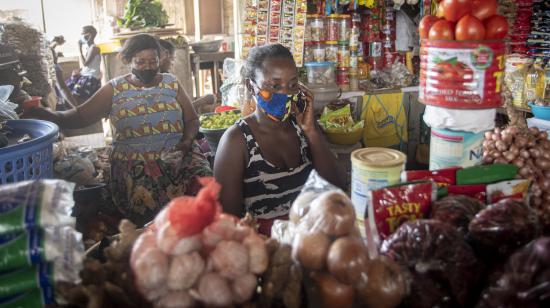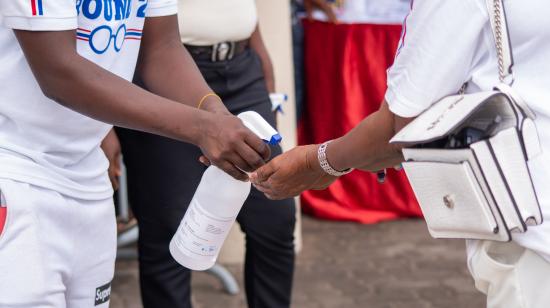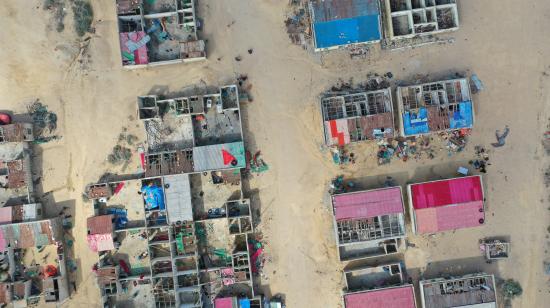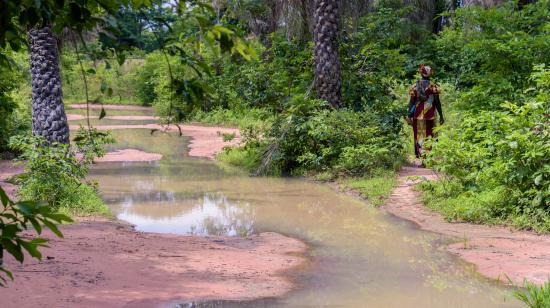Foreword
COVID-19 exposed the reality of global crises and challenges — from the vulnerabilities of data ecosystems and health systems to the need for clean, accessible water for all.
To assess these challenges and work out how to solve them, we need good data to understand what is happening, and effective skills to use that data to take appropriate action.
In 2020 — the year COVID-19 spread across the globe — the UN Economic Commission for Africa (UNECA) and the Global Partnership for Sustainable Development Data (the Global Partnership) worked together to play our part in responding to this unprecedented crisis.
Across Africa, we listened to what Governments wanted and found our network of partners were ready and willing to respond collectively to their needs. Building on five years of strong partnerships, in this time of crisis, our network came together to support each partner with vital resources, information, and experiences.
A common theme across our conversations was that COVID-19 intensified the urgent need for timely data. We worked in collaboration to bring partners together with the data, technology, and tools they needed.
COVID-19 also starkly demonstrated the need for that data to be produced, analyzed, and shared within a robust data system. Data systems take time to build securely and ethically, and we believe COVID-19 has clearly shown the need to continue creating them. There will be more pandemics and more global crises — including the ongoing climate crisis.
While focusing on the challenges of today, we did not forget about tomorrow. Our work has always been about the future of our societies and planet. The skills that have been built through these partnerships will also help Governments plan for sustainable development to mitigate climate change, track economic progress, and apply data science to get the best outcomes in health, education, and other critical challenges.
We need to be better prepared in the future. COVID-19 saw a rush for short-term fixes, creating a danger that poor-quality data will be used to inform important decisions or that data sharing oversteps its original purpose. To build a robust system for future crises, we need partnerships, we need skills in government to utilize those partnerships, and we need more public dialogue about what data is collected and shared, and why. This will mean more collaboration that builds trust between the public and private sectors, civil society, and academia, to lay the groundwork for future scaling up and flexibility when crises hit. Preparedness also requires stronger technical capacity in Governments in geospatial data and data science, not only for emergency response but also to improve data access and use across the range of government activities every day. At the Global Partnership and UNECA, we are working to ensure that the momentum gathered during the pandemic helps to build stronger systems for the future.
Ensuring that the vast potential of new data and technologies is used to make lives better, prevent crises, and protect our planet is a huge challenge. Getting it right will result in better policy and, ultimately, better lives. The Global Partnership and UNECA are committed to working with partners from every sector to build the data systems we need across the continent of Africa. We are bringing together organizations to interrogate assumptions and ask hard questions to make data partnerships more transparent and work together to protect rights and prevent data misuse.
We call on organizations with data, tools, skills, resources, and other capabilities to join us in using them to foster resilience amid the climate and health challenges ahead.
Introduction
On February 14, 2020, Africa recorded its first case of COVID-19, spurring many nations to quickly implement measures to curb the spread, including closing borders and enforcing lockdowns.
Governments across the continent needed to implement public health control measures. However, underinvestment and weak systems for data collection and analysis — especially cross-governmental institutions collection and sharing of data for quick decision-making — have been longstanding issues across the continent, and the situation worsened under COVID-19.
The pandemic has underlined the need for modern systems and innovative ways of gathering data.
Early on, the Global Partnership and UNECA jointly convened the Data for Now: Building Africa’s Resilience to COVID-19 initiative. Through this initiative, they broker partnerships to support modernizing countries’ statistical systems.
The focus of the partnerships is to strengthen countries’ response mechanisms as well as address the short- and long-term impacts of COVID-19 with data, through mapping populations, tracking the economic impact of the pandemic, and strengthening data ecosystems for the longer term.
From Senegal to Somalia
The initiative has been rolled out across Africa, supporting more than 40 partnerships between Governments and over 30 technical partners who bring data, skills, tools, and resources.
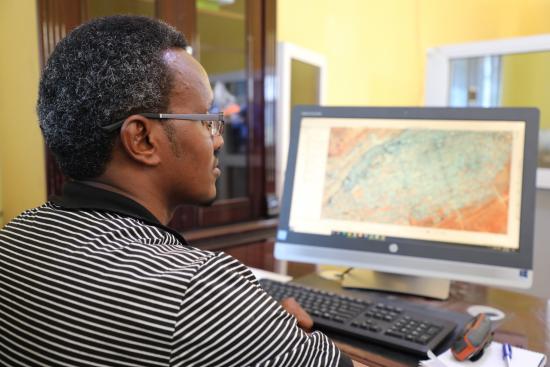
Abdirisak Aden, Head of GIS at the Puntland State Statistics Office examining the areas effected by Cylone Gati, Credit: Faaris Adam/GPSDD
This report offers insights into how and why data partnerships were so crucial during this unprecedented time and what was achieved when stakeholders from across the world came together to share resources. And it shows how this work will need to continue if the world is to be ready to meet future health crises and to tackle the looming threat of the climate emergency.
Data partnerships for urgent pandemic insights
Without a vaccine, in early 2020 the first line of defense against the pandemic was good data. Governments needed to see where the virus was spreading and where the vulnerable populations were concentrated, and to monitor the stocks of medicines and personal protective equipment available.
An early priority for Governments across Africa was to develop ways to bring together available data and make it easy to visualize for hard-pressed government decision-makers trying to protect public health, food security, and the economy. The Global Partnership and UNECA mobilized partnerships to share data across government and between the public and private sectors, and to make data easier to access and understand.
The Global Partnership facilitated the development and strengthening of COVID-19 data hubs in seven countries.
Countries were able to develop data dashboards featuring visual, analyzed data of confirmed cases, recoveries, deaths, and other indicators that could inform COVID-19 actions from Governments, businesses, and communities. These data hubs were able to provide immediate insights into the virus’s spread as well as the social and economic impacts. They also provided a foundation to add other metrics to be used for other needs, including future pandemics, health interventions, or climate change adaptation.
In many cases, government officials needed to rapidly acquire new skills to enable them to take advantage of new data sources and develop insights. The Global Partnership facilitated capacity-building partnerships to support immediate pandemic insights across 14 countries: Burkina Faso, Central African Republic, Ghana, Madagascar, Mauritius, Namibia, Nigeria, Senegal, Sierra Leone, Somalia, Somaliland, South Sudan, Togo, and Zambia.

That’s really something that we have seen changing, countries demanding more ways of looking at things in terms of how to disseminate data. Data collection and analysis can also be seen in real time. That’s also a big change."
New skills will outlast the pandemic and will strengthen data systems for the longer term, increasing the use of timely and inclusive data for decision-making across government. These data systems need to go beyond pandemics and encompass the broader economic and social impact of shocks such as pandemics, floods, and droughts.
Explore the case studies below to learn more about how some of these partnerships came to fruition.
Partnerships for future data needs
Data partnerships were critical in getting the right data to the right place to help manage the pandemic across Africa.
Yet the potential of these partnerships was much longer term — to leave behind stronger systems that could provide data in future crises and inform the routine business of government.
Community building, to share knowledge and strengthen relationships, was critical from the start. Before the program was even launched, in April 2020, UNECA and the Global Partnership hosted a session for partners to share their experiences and challenges in combating the impacts of the pandemic.
As the work developed, countries came together to learn from each other. The Global Partnership has hosted five joint learning activities, bringing together participants from 18 countries to share their expertise on topics including population mobility tracking, economic impact monitoring, and population census data. Many of these relationships will endure beyond the pandemic, strengthening data systems across the continent.
Within countries, too, there was an emphasis on relationships for the long term. Working groups were established in 11 countries (Cabo Verde, Ghana, Guinea, Kenya, Madagascar, Namibia, Nigeria, Sierra Leone, Somalia, Somaliland, and Togo) that brought together government and non-government actors, to create the formal and informal linkages that would outlast the pandemic and set the stage for building resilient systems in the years to come. UN country teams played a critical role, convening across the sector and bringing everyone to the table.
Explore the case studies below to learn more about how some of these partnerships came to fruition.
Skills for the future
Looking to the future means focusing on skills.
Throughout 2020, there was an emphasis on developing skills to sustain the impact of the program and to contribute to progress over time.
The skill-building included data science, environment data, machine learning, earth observations, gender data, inclusive data, and administrative data. Over the course of the year, more than 100 people from 20 countries and 47 different institutions — spanning national statistics offices; ministries of environment, agriculture, health, gender, and planning; and various academic departments — were involved in training activities.
Lessons for the next crisis
1. Trust is key. There must be trust between government, resource partners, and citizens for effective data sharing and consumption. Particularly in times of crisis, it is essential to make data available in a transparent and accessible way to foster awareness and trust.
2. Wayfinders increase efficiency. Identifying and collaborating with those at the country level who are trusted and experienced is critical, as they help drive the process by opening doors and expediting decision-making.
3. Preparation pays off. Facilitating rapid response data partnerships is most effectively done throughconsortia of technical partners that are ready to mobilize quickly, deploy their resources, and efficiently delegate based on the data context.
4. Build in sustainability. In setting up data infrastructure such as data hubs, it is important to consider the sustainability implications, from both a financial and a social perspective.
5. Community matters. Creating spaces to share experiences and learnings builds relationships and knowledge that strengthen the system.
6. Skills are the critical investment. A broad-based set of skills and the confidence and creativity to apply them are the best guarantor of a strong data system for the future.
7. Collaboration must enable solutions for local needs. Solutions become more effectively applied and sustainably maintained when they directly speak to local needs and put local players at the forefront.
Conclusion
The ongoing COVID-19 pandemic is the clearest possible lesson in how and why we need good data to make decisions.
Across the world, eyes continue to fix on graphs and daily cases and death tolls as nations battle COVID-19 outbreaks. Seeing those numbers rise or fall in almost real time showed politicians and the public whether measures like lockdowns were working to control the pandemic and made the authorities more accountable to the general public.
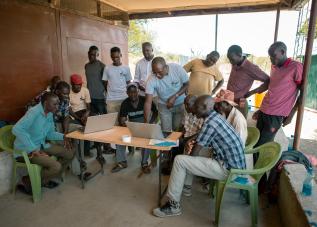
Through the Global Partnership and UNECA partnerships, we learned a lot about what was needed to support countries to adopt new technologies and methods. Fully utilizing new data involves bringing together partners who may not have worked together before. Trust is the bedrock, but trust underpinned by practical considerations focused on investment, sustainability, and accountability.
We continue to work with Governments and technical partners in their COVID-19 response, but the focus is increasingly shifting on recovery and building resilience through capacity-building and strengthening data ecosystems broadly. Out of the COVID work, we now have a brand-new country engagement strategy that is defining critical steps to a partnership-led scale-up and replication of our work in more countries. Over the next two years, we’ll more than double the number of countries we work in."
As they have worked together to tackle COVID-19, the Global Partnership and UNECA have kept sustainable futures as their key priorities. This pandemic was not the only health challenge nations faced over the last 18 months, and there will be more crises in the future. Data is crucial, and investments in data systems will pay off again and again.
One thing is clear: Trust cannot be forged overnight.
Sustained funding is needed to close the technical and social gap between supply-side technology providers, data holders, and academics and demand-side Governments in the Global South, and to establish global norms and cooperation on data governance to guide a common vision. We still have much to learn from one another.
Explore the interactive map below to learn about all of the partnerships that have been established as a result of this initiative.


